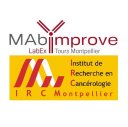


Department of Biological Chemistry and Molecular Pharmacology, Harvard Medical School
"Research in Dr Kruse's lab aims to elucidate the molecular basis of transmembrane signaling through the use of biochemistry, pharmacological studies, and structural biology. He is particularly interested in signaling pathways with connections to human health and disease, including G protein-coupled receptors and other transmembrane receptors. In the long term, he aims to leverage a detailed molecular understanding of these pathways to facilitate the development of new and better therapeutics."
Plus d'informations : https://kruse.hms.harvard.edu/home
Evergrande Center for Immunologic Diseases, Harvard Medical School
contact: nathalie.bonnefoy@inserm.fr

Evergrande Center for Immunologic Diseases, Harvard Medical School
contact: nathalie.bonnefoy@inserm.fr

CNIO, Madrid
Contact : Antonio Maraver

CNIO, Madrid
Contact : Antonio Maraver

Instituto Madrileño de Estudios Avanzados, Madrid, Espagne
contact: antonio.maraver@inserm.fr
More detailshttps://www.food.imdea.org/metabolic-syndrome-group

Instituto Madrileño de Estudios Avanzados, Madrid, Espagne
contact: antonio.maraver@inserm.fr
More detailshttps://www.food.imdea.org/metabolic-syndrome-group

Santiago de Compostela University Hospital, Espagne
Contact IRCM : Antonio MARAVER
More detailshttps://stemchus.wordpress.com/lab-members/

Santiago de Compostela University Hospital, Espagne
Contact IRCM : Antonio MARAVER
More detailshttps://stemchus.wordpress.com/lab-members/

Syntego Inc
This seminar dedicated to researchers at the IRCM will cover the following topics:
• CRISPR Experimental Design and Optimization (Knock-outs and Knock-ins)
• Synthego robust loss of function screens for confident target discovery
• Using CRISPR to uncover protein functions and pathway analysis
Join us for an interactive session about the latest CRISPR advances and applications. Discover the impact of CRISPR in cancer and genetic disease research.
Syntego Inc
This seminar dedicated to researchers at the IRCM will cover the following topics:
• CRISPR Experimental Design and Optimization (Knock-outs and Knock-ins)
• Synthego robust loss of function screens for confident target discovery
• Using CRISPR to uncover protein functions and pathway analysis
Join us for an interactive session about the latest CRISPR advances and applications. Discover the impact of CRISPR in cancer and genetic disease research.
professeur d'immunologie moléculaire et directrice de l'immunologie translationnelle au Centre d'immunologie du cancer de la faculté de médecine de l'Université de Southampton
Professors Sally Ward and Raimund Ober have recently relocated their research group from the USA to Southampton. Their interdisciplinary research program is dedicated to the use of protein engineering to develop novel antibody-based therapeutics.
The identification in the Ward/Ober laboratory of the Fc receptor, FcRn, as a regulator of IgG levels and transport has resulted in significant interest in targeting FcRn in biopharma. Extensive analyses of FcRn behaviour, including subcellular trafficking studies, have led to collaborations with biopharma to develop several therapeutics that are based on modulating the interactions of IgG with FcRn. For example, one such therapeutic (Efgartigimod) that inhibits FcRn activity has been developed in collaboration with Argenx, and has recently been successfully used in phase 3 trials to treat antibody-mediated autoimmune diseases.
"The presentation will cover how a combination of antibody engineering, fluorescence microscopy and mouse disease models have been used to inform the design of therapeutics to modulate the dynamic behavior of antibodies for the treatment of autoimmunity. In particular, the targeting of the MHC Class I-related receptor, FcRn, that recycles and transports IgG to maintain IgG homeostasis will be discussed. The generation of engineered antibody-drug conjugates that are designed to deliver their cytotoxic payload more efficiently to tumor cells will also be presented"
